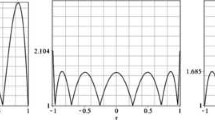Abstract
A complete derivation of Romberg integration for an arbitrary sequence of integration steplenghts, using classical interpolation theory only, is given. An explicit expression for the error is derived using Lagrange interpolation. From the general theory developed, several previous known results may be derived as special cases.
Similar content being viewed by others
References
F. L. Bauer, H. Rutishauser and E. Stiefel,New aspects in numerical quadrature, Proceedings of Symposia in Applied Mathematics, Vol. 15, American Mathematical Society, Providence, R.I., 1963.
T. Håvie,Derivation of explicit expressions for the error terms in the ordinary and the modified Romberg algorithm, BIT 9 (1969), 18–29.
T. Håvie,Error derivation in Romberg integration, BIT 12 (1972), 516–527.
D. P. Laurie,Propagation of initial rounding errors in Romberg like quadrature, BIT 15 (1975), 227–282.
T. Håvie,Romberg integration as a problem in interpolation theory, Math. and Comp. No. 2/77, ISBN 82-7151-019-3, Inst. f. num. mat., Univ. of Trondheim, (unpublished).
P. Henrici,Applied and computational analysis, Vol. 2, John Wiley & Sons, (1977).
Author information
Authors and Affiliations
Rights and permissions
About this article
Cite this article
Håvie, T. Romberg integration as a problem in interpolation theory. BIT 17, 418–429 (1977). https://doi.org/10.1007/BF01933451
Received:
Revised:
Issue Date:
DOI: https://doi.org/10.1007/BF01933451



